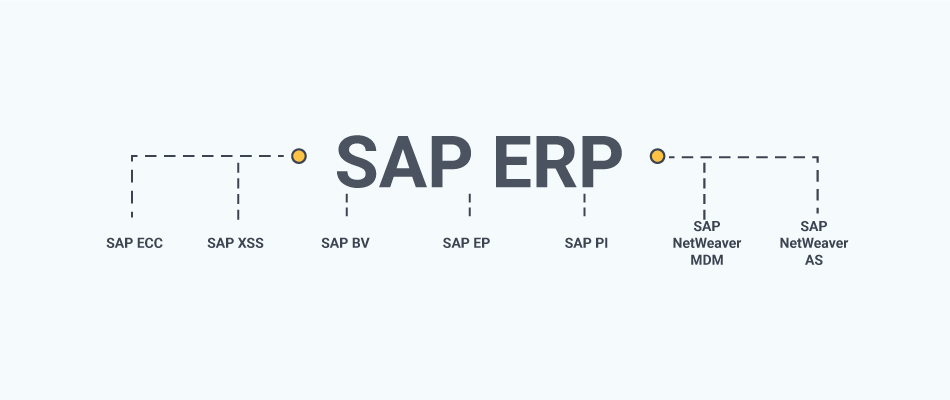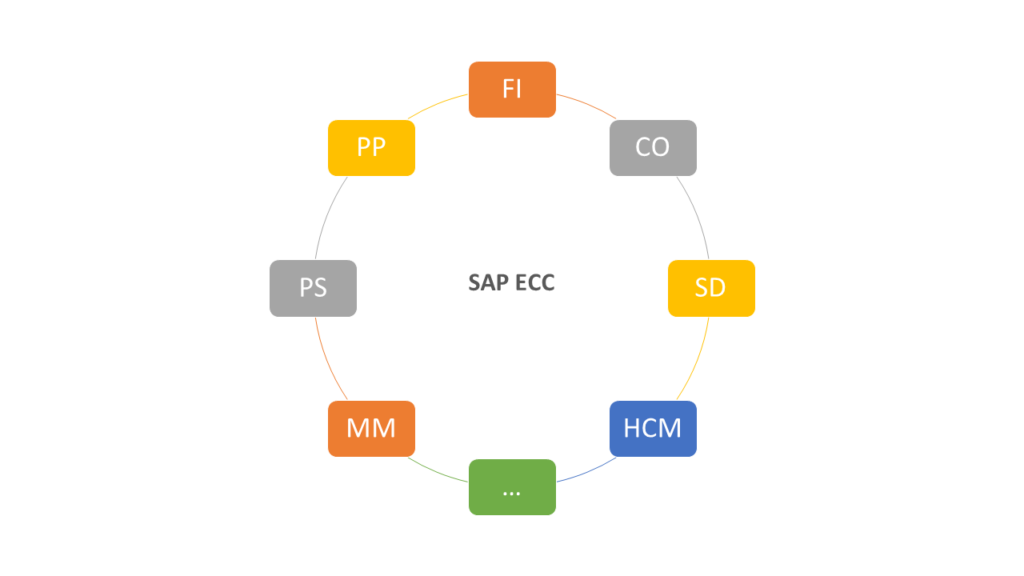In the intricate landscape of enterprise software, the acronym SAP ECC stands tall as a stalwart. For those not initiated into the realm of enterprise resource planning (ERP), navigating the depths of this acronym jungle can be a daunting task. What exactly does SAP ECC stand for? What functions does it perform, and what does the future hold for this software giant? Fear not, for this guide is your machete, cutting through the undergrowth and providing clarity in the intricate world of SAP ECC.
ECC is an ERP system and Business Suite’s core. ECC is an application suite that runs on a database, of which HANA is one example. HANA is SAP’s in-memory database. When ECC is run on HANA it’s called Suite on HANA. The full name is SAP Business Suite powered by SAP HANA.

I. SAP ECC Basics
A. Unveiling the Acronym
SAP ECC, at its core, stands for Enterprise Central Component. It serves as the beating heart of an organization, overseeing and managing critical aspects such as finance, accounting, human resources, and supply chain. Its foundation is built on a robust suite of core modules, with FI (Finance) and SD (Sales & Distribution) being the pillars that support an array of business processes.
| Module | Description |
| FI | Financial transactions, accounting, and reporting |
| SD | Streamlining the sales process from order to delivery |
B. Core Modules Decoded
FI (Finance): This module is the financial backbone, managing transactions, accounting, and reporting with precision.
SD (Sales & Distribution): At the forefront of customer engagement, this module streamlines the sales process from order creation to delivery.
C. Evolution of SAP ECC
SAP ECC, like any sophisticated software, has evolved over time. The version 6.0, a reliable workhorse, is slated to reach its end-of-life in 2025. This doesn’t signify abrupt software extinction but rather signals a gradual shift towards the next chapter in SAP’s journey: S/4HANA. This newer iteration boasts a sleeker interface, real-time insights, and the added flexibility of cloud-based operations, making it the future flagship of SAP’s ERP offerings.
| Migration Path | Description |
| SAP ECCn Extensions | Prolonging support for version 6.0 beyond 2025 |
| Hybrid Approach | Leveraging the strengths of both SAP ECC and S/4HANA based on unique organizational needs |
You can also check strategies for building a successful digital business
D. Navigating the Migration Paths
The migration from ECC to S/4HANA is a nuanced journey, and organizations may choose different paths:
SAP ECCn Extensions:
Some organizations may opt to extend support for version 6.0 beyond 2025.
Hybrid Approach:
Leveraging the strengths of both SAP ECC and S/4HANA based on unique organizational needs.
The Architecture Unveiled
A. A Towering Structure
Imagine ECC as a towering building with a solid foundation of core modules forming its base. These core modules, like FI and SD, are indispensable in driving the software’s functionality.
B. Specialized Modules
SAP ECC HCM (Human Capital Management): Catering specifically to human resources, this module ensures the organization’s workforce is managed efficiently.
Supply Chain Management: This module optimizes and streamlines supply chain processes, ensuring a smooth flow of goods and services.
C. Integration and Flexibility
SAP ECC’s strength lies in its ability to seamlessly integrate with other systems, external applications, and custom developments. This flexibility allows businesses to sculpt their ERP landscape according to their unique requirements.
Mastering SAP ECC
A. A World of Training Resources
Online Courses: Whether you’re a seasoned professional or a curious newcomer, online courses offer a range of learning opportunities.
Certifications: Validating expertise in specific ECC modules, certifications are a valuable asset in the professional realm.
Bootcamps and Workshops: Hands-on experiences provide practical insights, enhancing understanding and proficiency.
Investing in training not only unlocks the full potential of ECC but also future-proofs skills in the dynamic field of enterprise software.
| Training Resource | Description |
| Online Courses | Accessible for both beginners and experienced professionals |
| Certifications | Validates expertise in specific SAP ECC modules |
| Bootcamps and Workshops | Hands-on experiences provide practical insights, enhancing understanding and proficiency |
SAP R/3 vs. ECC: A Historical Perspective
Addressing the historical context, Sap R/3 serves as the predecessor to ECC. R/3 laid the foundational groundwork, paving the way for ECC, which inherited and modernized the family legacy with significant upgrades.
Conclusion
In conclusion, SAP ECC is more than a software solution; it’s a powerful ecosystem that empowers businesses to thrive in the digital age. Understanding its meaning, exploring its modules, and deciphering its architecture is the initial step towards unlocking its vast potential. As the horizon of 2025 approaches, staying informed about future iterations like S/4HANA and navigating migration options becomes paramount. Whether you’re a seasoned user or a curious newcomer, the world of SAP ECC invites exploration. Arm yourself with metaphorical machetes of knowledge, embrace the continuous learning journey, and get ready to conquer the ERP jungle!
FAQs:
Q1: What does SAP ECC stand for?
A: SAP ECC stands for Enterprise Central Component. It serves as the core of an organization’s software infrastructure, managing finance, human resources, and supply chain functions.
Q2: What are the core modules of SAP ECC?
A: The core modules include FI (Finance) and SD (Sales & Distribution), forming the backbone of business processes.
Q3: What is the future of SAP ECC?
A: Version 6.0 is reaching its end-of-life in 2025, paving the way for S/4HANA. This newer version offers a sleek interface, real-time insights, and cloud-based agility.
Q4: What are the migration options for SAP ECC?
A: Organizations can opt for SAP ECCn extensions, prolonging support, or choose a hybrid approach, leveraging both SAP ECC and S/4HANA based on individual needs.
Q5: How does SAP ECC integrate with other systems?
A: SAP ECC excels in integration, seamlessly connecting with external applications and custom developments, providing flexibility in shaping the ERP landscape.
Q6: What are the specialized modules in SAP ECC?
A: Specialized modules include ECC HCM (Human Capital Management) and Supply Chain Management, catering to specific organizational requirements.
Q7: How can I master SAP ECC?
A: Mastering SAP ECC involves investing in various training resources, including online courses, certifications, and hands-on workshops for both beginners and seasoned professionals.
Q8: What is the difference between SAP R/3 and ECC?
A: SAP R/3 is the predecessor, laying the foundation for ECC. ECC inherits and modernizes the family legacy, making significant upgrades for enhanced functionality.
Q9: Why is understanding SAP ECC important?
A: Understanding SAP ECC is crucial for businesses to thrive in the digital age. It empowers organizations to optimize processes and stay informed about future iterations like S/4HANA.
Q10: How can I stay informed about SAP ECC updates?
A: Stay connected with our guide for the latest updates on SAP ECC, its evolution, and the dynamic landscape of enterprise software







